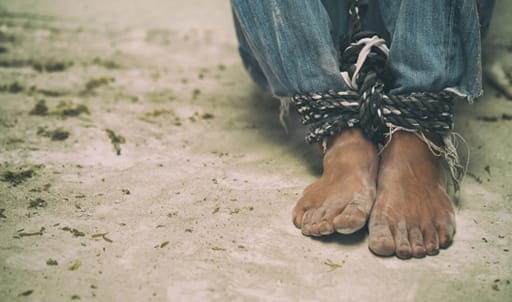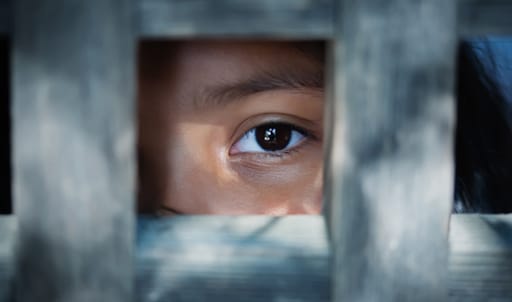Listen to the podcast
Human trafficking: Real evil
“He was an extremely prominent human rights activist. And he was accused of getting vulnerable children trafficked to him for sex.”
Deep breath. This podcast takes a dive into human trafficking, a stain on our race that some choose to dilute or deny either through ignorance or because of the evil it suggests we’re capable of.
That opening quote came from Luke Lamprecht, Head of Advocacy for Women and Men Against Child Abuse, during a Future Impact podcast hosted by Investec and Cliff Central. It laid bare the sinister realities and mechanics of human trade.
Define trafficking
“There was a trafficker who took his victim to see her mom at a Wimpy every other week. And he would go right back to exploiting her after their coffee. Trafficking can happen inside a neighbourhood. It can be very complex.”
Marcel van der Watt is a senior research analyst with the National Centre on Sexual Exploitation, and a research fellow at the Centre for Human Rights at the University of the Free State.
His harrowing example illustrates how amorphous human trafficking can be. Globally, he believes truncated definitions are to blame for a material underestimation in the true number of victims; he is more complementary about how we define it in our Prevention and Combatting of Trafficking in Persons Act (PACOTIP):
Any person who delivers, recruits transports, transfers, harbor’s, sells, exchanges, leases or receives another person within or across the borders of South Africa by means of:
- Threat or harm
- Threat or use of force or other forms of coercion
- The abuse of vulnerability
- Fraud
- Deception
- Abduction/kidnapping/abuse of power within or across the borders of the Republic for the purpose of the exploitation of that child/person in any form or manner is guilty of human trafficking.
In numbers: modern slavery globally
49.6 million
27.6 million
6.8 million
3.8 million
Source: International Labour Organisation's Global Estimates of Modern Slavery Forced Labour and Forced Marriage

How people fall
Desperation is the weapon of the human trafficker.
“There was a young woman who couldn’t get a child grant. She had no income. She left her child with her mother and came to work in Joburg. It was two decades ago, but she was being rented out for R20 for sex,” remembered Lamprecht.
Sex is not the only medium of exploitation nourished by desperation. According to Van der Watt, there’s an illicit, slave-like labour trade between African countries.
“Every weekend, we have at least 45 men entering SA from a small village in Mozambique. They are transported to the Welkom area for illegal mining. The syndicates that deliver these individuals charge anywhere between 6,000 to 8,000 US dollars per worker.”
That form of trafficking stokes humanitarian crises with financial repercussions: hard currency flows out of SA which undermines our economic resilience.
Tech & moles
If you, like your correspondent, harbour fears about social media, prepare to double down.
“Undercover, I sat with a Nigerian trafficker who showed me how he was busy onboarding 70 women using WhatsApp, Facebook and Twitter. He had created a sophisticated fake profile connected to other fake accounts including profiles for a mom, dad, brother and employer. He controlled them all to create the illusion,” explained Van der Watt.
He cites an equally audacious tech-enabled tactic where trafficking operations create mirror company websites and use them to recruit people.
Compounding matters is the fluidity of the trafficking syndicates and the presence of deviant moles inside the very institutions mandated to protect people.
“There are usually extremely wealthy people running these sex rings. Often, they choose jobs that give them access to vulnerable children.”

Why it’s so hard to get out
Understanding the barbed hooks, sunk into trafficking victims by their captors, can provide the critical context needed to fully empathise.
Passports
Before they realise the full extent of their predicament, foreign trafficking victims have their passports and identification documents taken from them, anchoring them to their captors.
Drugs
Prevalent in the sex trade, drugs that temporarily let victims escape their hell are made readily available and then deployed as leverage once the physical addiction takes hold.
Shame
The prospect of returning to the family or community they left behind for honest work is made untenable by the deep feelings of shame experienced by trafficking victims.
Violence
Human traffickers are well-versed in the psychology of fear, using emotional or physical intimidation to keep their victims quiet and compliant.
Isolation
Trafficking victims who manage to rip themselves out of the system often find no support structure in place to cement their moment of courage.
Prosecution problems
According to Lamprecht, trafficking victims tend to make poor witnesses, for two reasons. First, their credibility is often in doubt, especially if they have fallen into drug use.
Second, foreign victims are often transported back to their country of origin – deemed illegal immigrants – depriving them of the opportunity to testify.
Obviously, prevention of these crimes would be best. But Van der Watt says that little is being done to deter or suppress the demand for commercial sex and forced labour.
“There’s an entitlement that you can buy somebody else as a commodity, that you can pay for sex or labour without caring if they are children or slaves. That is the root of the problem. Best practice in other parts of the world is to target demand.”
Breaking the chains
“We look for key words or phrases that suggest financial flows might be tied to trafficking. If financial institutions can come together, sharing information around suspicious transactions, we can work to identify and stop trafficking,” said Aveena Gajadhar from the Financial Crime Compliance Team at Investec.
Identifying dodgy transactions is one thing. But banks can do better. In their research, Gajadhar and her team have found that victims return to their captors because they have no other way to earn a living.
“Often, victim’s passports and identification documents are taken away. We are working with regulators to see how we can help them legally open bank accounts without those documents. That way, they can get paid if an NGO is able to find them legitimate work.”
In his concluding remarks, Van der Watt extolled South Africa’s uniquely contextual trafficking legislation and its successful prosecutions, albeit below what they should be given the caseload.
Lamprecht’s takeaway was this: human trafficking takes place all around us, often perpetuated by powerful people. If we are to prevent these dark injustices and prosecute those responsible, we must keep our eyes and ears open, and our tongues untied.
Evil triumphs when good men and women do nothing.
Receive Focus insights straight to your inbox



